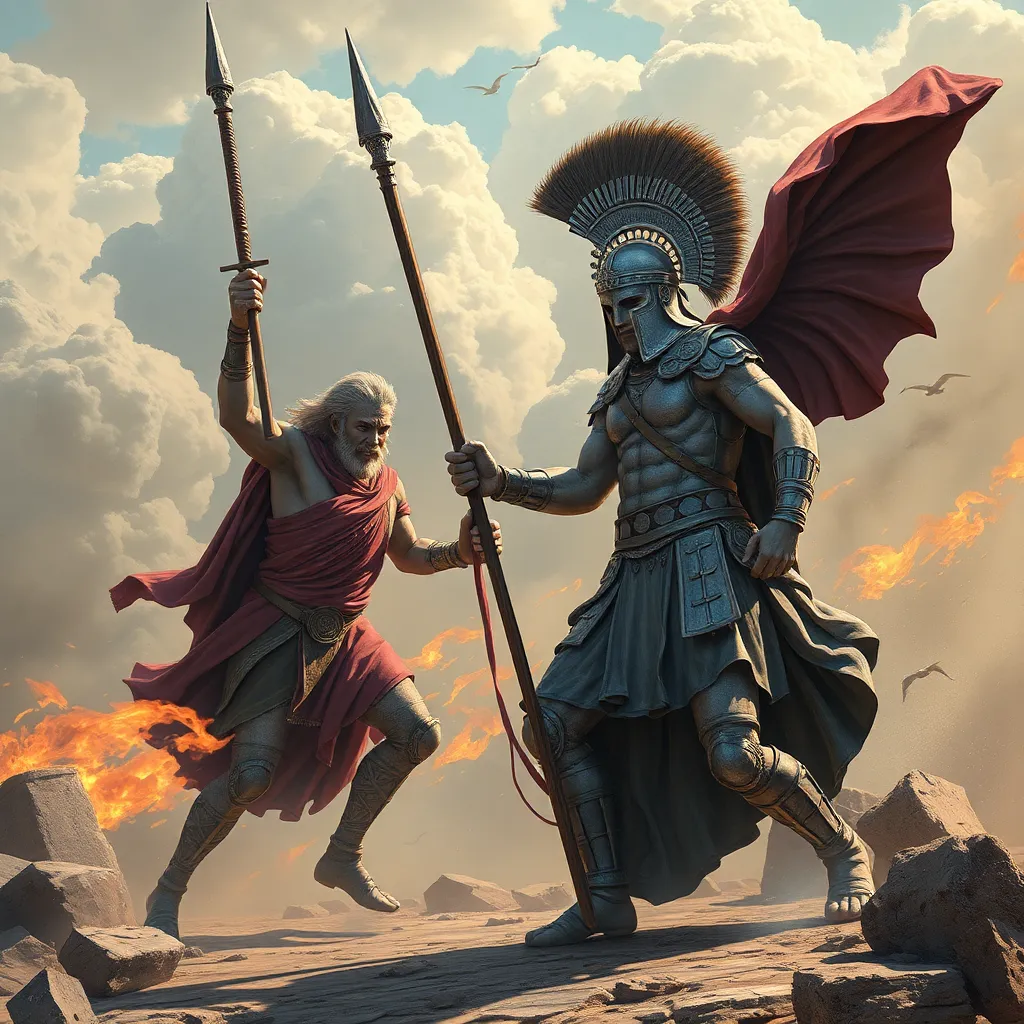Ares and the Concept of War in Ancient Philosophy
I. Introduction
Ares, the Greek god of war, represents one of the most complex and multifaceted deities in ancient mythology. Known for his fierce and aggressive nature, Ares embodies the brutal and chaotic aspects of warfare. In a society where war played a crucial role in politics, culture, and daily life, the figure of Ares was significant in both myth and reality.
War was not merely a backdrop in ancient Greek life; it was a defining element that shaped the identities of city-states and their citizens. The purpose of this article is to explore Ares and the philosophical implications of war, examining how ancient Greeks viewed conflict and its ethical dimensions.
II. The Mythological Background of Ares
Ares is often depicted as a powerful warrior, clad in armor and accompanied by symbols of violence and bloodshed. Unlike Athena, who represents strategic warfare and wisdom, Ares personifies the chaotic and destructive nature of battle.
- Characteristics: Ares is known for his impulsiveness, aggression, and thirst for battle. He often revels in the chaos of war and is less concerned with the honor of victory or the morality of conflict.
- Attributes: Common attributes associated with Ares include the spear, helmet, and shield, along with his companions, Phobos (Fear) and Deimos (Terror).
The cultural significance of Ares in ancient Greece cannot be understated. While many Greeks admired the valor associated with warfare, Ares also represented the darker side of human nature, which brought about destruction and suffering. This duality made him a controversial figure in Greek mythology.
III. Philosophical Perspectives on War
War has been a subject of contemplation in early Greek philosophy, with thinkers like Heraclitus exploring its nature. Heraclitus famously stated that “war is the father of all things,” suggesting that conflict is a fundamental aspect of existence.
The duality of war can be seen in various philosophical interpretations:
- Destruction vs. Order: War can lead to the annihilation of life, yet it can also serve as a catalyst for societal change and the establishment of order.
- Ares as a Symbol: Ares embodies chaos and conflict, raising questions about the morality of war and its place in human society.
IV. Ares and the Just War Theory
The Just War Theory, which seeks to reconcile the morality of war with the necessity of conflict, has roots in ancient philosophical thought. This theory considers the justifications for entering war and the ethical conduct within it.
Ares’ role in the justification of conflict is complex:
- Mythological Justification: Many myths portray Ares as a necessary force in battle, suggesting that conflict is an inherent part of human existence.
- Ethical Implications: The invocation of Ares in discussions about just war raises critical ethical questions about the nature of violence and the morality of those who wage it.
V. Ares in the Works of Plato and Aristotle
Philosophers such as Plato and Aristotle addressed the nature of war and its implications for society, providing contrasting views that reflect their philosophical frameworks.
- Plato: In works like “The Republic,” Plato emphasizes the importance of a just and virtuous society, where war should only be waged for the greater good. He critiques the chaotic nature of Ares, suggesting that true guardians should embody wisdom and justice rather than mere aggression.
- Aristotle: Aristotle’s perspective in “Nicomachean Ethics” discusses conflict in terms of virtue and the pursuit of the good life. He acknowledges the inevitability of war but stresses the importance of moral conduct and the pursuit of a just cause.
Comparing these philosophical approaches reveals the complexities of Ares and war within the context of ancient Greek thought.
VI. The Influence of Ares on Later Philosophical Thought
Ares’ influence extends beyond ancient Greece, impacting Roman philosophy and literature. Roman authors often adopted Greek myths and reinterpreted them, with Ares (known as Mars) gaining new dimensions in the context of Roman militarism.
- Legacy: The legacy of Ares can be seen in modern philosophical debates about war, militarism, and ethics. His figure raises questions about the justification of warfare in contemporary society.
- Contemporary Discussions: The discussions surrounding Ares resonate in today’s world, where militaristic values often clash with ethical considerations, prompting reflections on the nature of conflict.
VII. Ares in Art and Literature
Ares has been a prominent figure in ancient art and literature, serving as a muse for countless artists and poets. His depictions reflect the cultural attitudes towards war in ancient Greece.
- Art and Sculpture: Ares is often depicted in sculptures as a muscular and fierce warrior, embodying the ideals of strength and valor, but also chaos and destruction.
- Literary Representations: In epic poetry, Ares appears in various narratives, often associated with the consequences of war. Works like Homer’s “Iliad” illustrate both the glory and tragedy of conflict.
These artistic and literary representations offer insights into how ancient Greeks perceived war and the implications of Ares’ influence on their culture.
VIII. Conclusion
In summary, Ares, as the Greek god of war, serves as a complex symbol of the dual nature of conflict—both its destructive and transformative aspects. The exploration of Ares through the lens of ancient philosophy reveals deep insights into the ethical implications of war and the ongoing relevance of these discussions in contemporary society.
The philosophical discourse surrounding war continues to be relevant, prompting us to reflect on the nature of conflict, its justification, and the moral responsibilities of those who engage in it. Ares remains a powerful figure through which we can examine the enduring nature of war and its philosophical implications.




